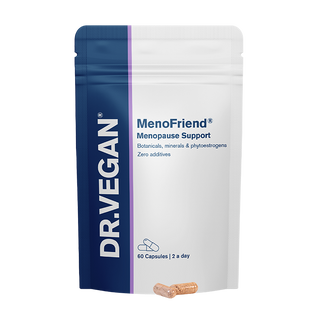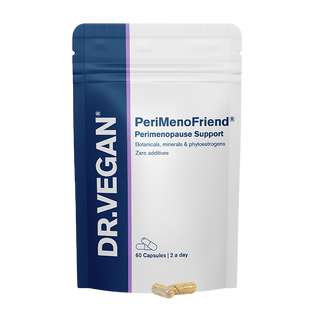Top 10 questions about HRT answered

Hormone Replacement Therapy (HRT) is a common treatment for management of menopause symptoms, but many women have questions about its benefits, risks, and if they are suitable to take it. Making informed decisions, especially regarding hormone replacement therapy, is crucial. Hormone and menopause specialist Dr. Katie Hodgkinson answers the top 10 most frequently asked questions about HRT.
1. What exactly does HRT do?
HRT helps alleviate menopause symptoms such as mood swings and night sweats and reduces osteoporosis risk. It replaces oestrogen and progesterone (and testosterone if indicated) in women going through menopause. Systemic HRT is in the form of a tablet, patch, spray, or gel, and in addition, either on its own or alongside systemic HRT, is vaginal oestrogen for ongoing uro-genital symptoms such as vaginal dryness or bladder symptoms.
2. How do you know if HRT is right for you?
A discussion with a healthcare provider, considering medical history and individual risk factors, will help determine if HRT is appropriate. The type of HRT that's best for you depends on different factors, such as if you've had a hysterectomy, which stage of menopause you're at, and your personal preferences. If HRT is not right for you or you would prefer not to take it, then alternative non-hormonal options can be considered. Learn how to talk to your doctor about menopause.
3. When do you start HRT?
HRT is typically started when perimenopause or menopause symptoms begin, often between the ages of 45 and 55, although it can be earlier. It is most effective when started within 10 years of menopause onset or before the age of 60.
Menopause resources
4. What are the benefits of HRT?
The key benefits of HRT include effective relief of vasomotor symptoms (hot flashes and night sweats) and other symptoms associated with menopause, maintenance of bone mineral density, and reduced risk of fractures associated with osteoporosis. There are potential benefits for cardiovascular and cognitive health and possibly reduced Alzheimer's risk (although more research is needed) when started early in menopause. There may also be a reduced risk of colorectal cancer and type 2 diabetes.
5. What are the risks and side effects of HRT?
For most healthy women under 60, the benefits of HRT outweigh the risks. Oral oestrogen may slightly increase the risk of blood clots and stroke, but oestrogen applied to the skin does not carry this risk. There may be a small increased risk of breast cancer, particularly with long-term use, but this is generally low. If you have a womb and are taking oestrogen alone, then womb cancer risk can increase, and so progesterone or a progestogen is given with oestrogen to minimise the risk. Side effects, if they occur, such as bloating, breast tenderness, headaches, or nausea, can often be managed by adjusting the dose or type of HRT. Abnormal bleeding may also occur and may need investigation in some cases.
MenoFriend®

6. Who should avoid HRT?
Most women can take HRT, but it may not be suitable for those with certain conditions, such as pregnancy, a history of hormone-sensitive cancers, or unexplained vaginal bleeding. A healthcare professional can help assess suitability. If HRT is not an option, non-hormonal alternatives like anti-depressants or other medication, cognitive behavioural therapy (CBT) and supplements such as phytoestrogens, Omega 3 fatty acids, and Vitamin D may offer support. Regardless of HRT use, maintaining a healthy lifestyle with a balanced diet, exercise, and stress management is beneficial.
Discover our menopause hub; it includes resources to help support women through all stages of menopause
7. How long can you safely be on HRT?
According to the British Menopause Society, there is no strict time limit for HRT use. The duration should be individualised based on a woman's symptoms and health profile, with regular reviews to assess the ongoing need for treatment. Many women safely use HRT for more than 5 to 10 years, particularly for symptom control and bone health. The lowest effective dose should be used for as long as necessary, with an emphasis on regular medical evaluations to weigh benefits and risks.
8. How can I tell if my HRT dose is right for me?
The right HRT dose should effectively relieve symptoms without causing significant side effects. If symptoms persist or side effects occur, adjustments may be necessary under medical supervision. Note there may be causes other than menopause or ongoing symptoms, which may need investigation and further discussion.
PeriMenoFriend®

9. What are some signs that HRT is not working or that you are having a reaction to it?
Persistent symptoms, breakthrough bleeding, headaches, nausea, or mood changes may indicate an incorrect dosage or formulation. In rare cases, serious reactions like swelling, chest pain, or severe headaches require urgent medical attention.
10. Should HRT be taken as a preventative measure for health risks?
While HRT may have some protective effects on heart and bone health, it is not recommended solely for disease prevention. The British Menopause Society states, "The balance of benefits and risk, however, does not support the use of HRT for primary or secondary prevention of disease, and international guidance recommends against use of HRT without a clear indication."
Conclusion
HRT can be an effective treatment for menopause symptoms, but it is not a one-size-fits-all solution. Consulting with a healthcare professional ensures that the benefits outweigh any risks based on your individual circumstances. Exploring all options, including lifestyle changes, is key to you making an informed decision about the management of menopause.
















